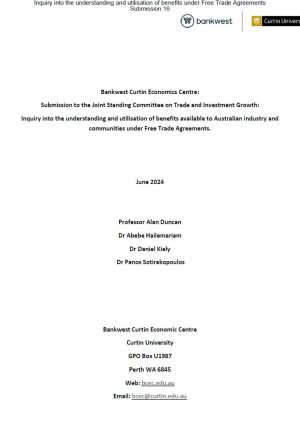Submission to the Joint Standing Committee on Trade and Investment Growth: Inquiry into the understanding and utilisation of benefits available to Australian industry and communities under Free Trade Agreements

Abebe Hailemariam, Senior Research Fellow
Daniel Kiely, Senior Research Fellow
Panagiotis Sotirakopoulos, Research Fellow
This submission was prepared in response to the Joint Standing Committee on Trade and Investment Growth inquiry into benefits of Free Trade Agreements (FTAs) to Australia.
This inquiry was established to report on the understanding and utilisation of benefits available to Australian industry and communities under FTAs.
BCEC’s submission focused on the following aspects of the inquiry:
a) What level of understanding is present of the social and economic benefits provided by FTAs
b) The uptake of economic benefits to Australian businesses created by FTAs across Australia
e) How the Australian Government monitors and measures utilisation of FTAs.
Recommendations
- Continue to monitor the impact of tariffs and the removal of such on Australian exporters. This includes the extent to which sectors can pivot to new markets and the impact on volumes, value and the timeline to recovery. This is particularly important in the case of environmental goods given that Australia has a proven potential to be a leader in the global effort for decarbonisation.
- Develop effective communication strategies of findings of key studies on the economic benefits of FTAs at granular levels by geography and demography.
- A survey of representative households and individuals across demographic groups about their perceptions of the impact of FTAs on their personal financial conditions would be informative to enhance the understandings on heterogeneous impacts of FTAs.
- Detailed and accessible firm level data (for example, using longitudinal surveys) would provide greater insights into the take up of opportunities presented by FTAs. Such data would add light to the benefits across industry by business size and other business characteristics (such as location, industry, ownership structure, gender, etc.). This would also inform barriers to engaging in international trade and inform policy to further support the business community.
- Disseminate research findings in a manner that is accessible to policy makers, industry and the broader public. Examples such as the roundtables and media engagement discussed here are good cases in point to help bring researchers, policy makers, industry and the broader community together.






